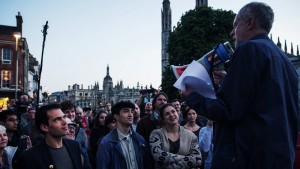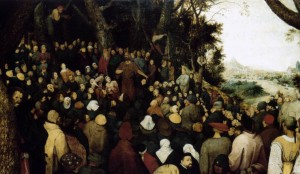 At this time of year, we all receive many Christmas cards. The one thing that all Christmas cards have in common is a picture on the front. It may be a nativity scene or some representation of people having a good time. In the past we used to receive many Christmas cards harking back to a lost time in the early 19th century which the card designer seemed to think represented quintessential Christmas cheer. For some reason Christmas was thought to involve stage coaches, street scenes and snow. But whatever the picture, the important thing is that each card gives us something to look at, something that in different ways evokes the Christmas event.
At this time of year, we all receive many Christmas cards. The one thing that all Christmas cards have in common is a picture on the front. It may be a nativity scene or some representation of people having a good time. In the past we used to receive many Christmas cards harking back to a lost time in the early 19th century which the card designer seemed to think represented quintessential Christmas cheer. For some reason Christmas was thought to involve stage coaches, street scenes and snow. But whatever the picture, the important thing is that each card gives us something to look at, something that in different ways evokes the Christmas event.
I have mentioned in previous blogs my concern and interest for the church in Eastern Europe – the Orthodox Church. In my early twenties I spent some 10 months in various Orthodox countries, mainly Greece, being exposed to a completely different way of being a Christian. One important thing that I learnt in those months all those years ago was the language of pictures. By this I do not mean that the Orthodox are only concerned with icons to the exclusion of everything else, but that the whole atmosphere of worship and theology seems to be highly visual. Seeing a picture or a ritual act rather than listening to words as we do in the West, is a vital component of their religious life. Attendance at worship for a typical member of an Orthodox church will involve the use of the eyes as much as, if not more than, the faculty of hearing. In many Orthodox countries the actual words of the liturgy are largely incomprehensible to the ordinary worshipper. The Russians use a version of old church Slavonic which is quite different from modern Russian. The Greeks also use for worship an archaic form of their language which was understood better in the days of the Byzantine Empire which came to an end in 1453. Obviously some parts are understood but also much of what is heard remains obscure to the congregation. In the Greek service books, the priest is instructed to say the words of the prayer of consecration in such a way that no one can hear it.
These comments about Orthodox worship lead me to my main point that Christians in the East do far more in the way of seeing that they do through listening to words and ideas. We could say in summary that they live in a visual culture rather than one which attempts to put everything into words. These comments about Orthodoxy provide me with an introduction to the thought that Christmas is for most of us a visual event. Its appeal and popularity are in part because the pictures that represent it are attractive to our imaginations. A preacher at Christmas might possibly talk about the meaning of the Incarnation, but he will also realise that Christmas exists far more as a visual event in people’s minds. There are many varieties of traditional scene that we can conjure up in our minds to remind us of the events of the birth of Jesus. The traditional Christmas cards reinforce these images. Some focus on the star shining in the East and showing the way to the stable for the wise men. Another picture which is frequently represented is the singing of the angels to the shepherds on the hills around Bethlehem. Yet another will dwell on the simplicity of the stable with the animals standing around. Some of us will have questions about whether these events actually happened in the way they are depicted on the cards, but equally something powerful is being communicated to us through them.
By emphasising what happens when we look at pictures of Christmas, we have moved away from thinking of Christmas as a doctrine or as a literal historical event, to seeing it as an evocative statement of how we understand God to participate in the world. In this we are beginning to think and visually evoke the Christian message like Orthodox believers. By this I do not mean that the Orthodox have ever been drawn to appreciate the western representations of the Christmas event. What I am indicating is that a strong emphasis on visual material at Christmas is similar to the Orthodox preference for meditation and contemplation in the presence of images. To look at a picture of a star in the sky being followed by three men on camels, will not illuminate us in any finer point of theology. What it might do is to help us to see that following an inner light may help us to discover new meaning and new understanding of what God wants us to be and to do. To pick up a point from my last post, the pictures and images of Christmas, whichever ones we choose, may well touch our hearts and help to create in us once more a new longing for the infinite, the ultimate and the true. We sing carols, we listen to readings and pray, not because we can learn some new information or obtain some new knowledge, but so that something inside us can once again be touched and drawn out of us. It may be that, in spite of the over-familiarity of the story, our hearts can be renewed to contemplate the reality of God afresh, one who identifies himself with our world.
Christmas is then, I would claim, a festival of pictures and inward seeing. This is a different kind of understanding and apprehension of reality to what we are used to. Perhaps in our world so obsessed with words and rational concepts, it is a way of understanding that most of us need to engage with far better. So this Christmas maybe we can learn, not only to listen to the stories, but to see deeper into the pictures and images of the season. By using our imaginations and our hearts, we may glimpse better the encounter of God with humanity that is at the heart of this festival. We will never fully understand the theology of the Incarnation, but perhaps we may be able to see something more of its meaning through the pictures that are given us this time. The light shines in the darkness. May we be able to come into this light and know something more of God’s radiance. It is that radiance that we encounter in Jesus as he guides us through our lives. As his light shines in the darkness, may we learn better to walk in that light.







